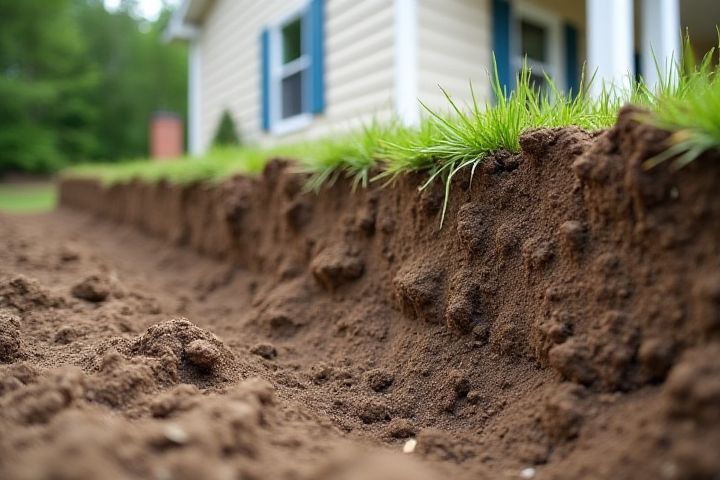
If your house has foundation issues, it's crucial to assess the severity of the damage. Begin by looking for cracks in walls, uneven floors, or doors that stick, as these may indicate underlying problems. Engage a licensed structural engineer to conduct a thorough inspection, ensuring that you receive a professional evaluation of the situation. Depending on the extent of the damage, you may need to consider foundation repair methods such as underpinning, slabjacking, or wall anchors. Addressing foundation issues promptly can prevent further damage and costly repairs in the future, maintaining the structural integrity and value of your home.
What To Do If House Has Foundation Issues
Conduct a thorough inspection.
Conduct a thorough inspection to identify the extent of foundation issues affecting your house. Look for visible cracks in walls, doors or windows that are misaligned, and any signs of water damage in basements or crawl spaces. Utilize tools like a level to measure any sloping floors, and consider hiring a structural engineer for a professional assessment, which can cost between $300 and $800. Addressing these concerns early can prevent further damage and may preserve your property value, which typically appreciates at an average rate of 3-5% annually.
Consult a structural engineer.
Consulting a structural engineer is crucial when addressing foundation issues in your house, as they possess the expertise to conduct a thorough assessment of structural integrity. They will typically use diagnostic tools and techniques, such as soil analysis and crack measurement, to determine the extent of the problem. Post-evaluation, they may recommend solutions, which can range from underpinning to drainage improvement, depending on the specific issue and its severity. Taking prompt action by seeking professional advice not only ensures safety but can also prevent further costly repairs down the line.
Identify the signs of damage.
Identify the signs of foundation damage by examining your home for cracks in walls, particularly around windows and doors, as well as uneven floors. Pay attention to gaps between walls and ceilings, which may indicate shifting foundations, and inspect for any sagging or bowing in the structure. Monitor external elements, such as soil erosion or water pooling near the foundation, as these can exacerbate issues. Conducting a thorough assessment can help you address potential problems before they escalate, ensuring your home remains safe and stable.
Prioritize immediate safety concerns.
If your house exhibits foundation issues, prioritize immediate safety concerns by conducting a thorough inspection to identify visible signs of damage, such as cracks in walls, uneven floors, or doors and windows that stick. It's crucial to limit access to the affected areas, ensuring you and your family avoid potential hazards. You may need to consult a structural engineer for a professional assessment, as they can determine the severity of the damage and recommend appropriate stabilization methods. Addressing these issues promptly can prevent further deterioration and safeguard your home's structural integrity.
Obtain multiple repair estimates.
Obtaining multiple repair estimates is crucial when dealing with foundation issues in your house, as costs can vary significantly among contractors. Aim to gather at least three detailed estimates, ensuring each includes a comprehensive assessment of the damage, proposed solutions, and a timeline for repairs. Doing so not only helps you make informed decisions but also allows you to spot discrepancies in pricing and scope of work. When selecting a contractor, prioritize their experience with similar foundation problems and verify their licenses and insurance coverage for added peace of mind.
Explore different repair solutions.
When addressing foundation issues in your home, explore various repair solutions to find the most effective method for your situation. Common options include underpinning, which involves reinforcing the foundation by extending it deeper into stable soil, or using piers to lift and support the structure. Another approach is wall anchors, which stabilize leaning walls while providing an affordable fix for bowing foundations. For minor cracks, epoxy injections can be used to seal and restore strength, ensuring your home remains safe and structurally sound.
Assess potential financing options.
Evaluating potential financing options is crucial when addressing foundation issues in your home. Consider home equity loans and lines of credit, which often offer lower interest rates due to your home being collateral. Alternatively, personal loans may provide accessible funds without needing to leverage your property, typically ranging from $1,000 to $50,000. You may also explore government-backed loans, like FHA 203(k) loans, which can cover renovation costs associated with foundational repairs, making them an appealing choice for necessary improvements.
Consider insurance coverage limits.
When facing foundation issues in your house, first assess your insurance policy to understand the coverage limits related to structural damage. Many homeowner's insurance policies may not fully cover foundation repairs, especially if the damage is due to gradual wear or lack of maintenance. Contact your insurance agent for clarification on your policy's terms and to discuss potential claims for repair costs. It might also be beneficial to consult with a professional foundation repair contractor to obtain detailed estimates that can help guide your insurance discussions.
Determine long-term impacts on property value.
Foundation issues can significantly impact property value, often leading to a decrease of 10% to 30%. Homebuyers typically view homes with foundation problems as high-risk, which may make your property less appealing in the market. Investing in professional assessment and repairs can mitigate long-term depreciation, potentially restoring up to 95% of the repair costs if managed properly. Understanding the specific issues and obtaining clear documentation can help you make informed decisions, ensuring your property retains its worth in the long run.
Monitor ongoing changes after repairs.
After addressing foundation issues in your home, it's crucial to monitor ongoing changes to ensure stability. Regularly inspect walls for cracks, doors for sticking, and floors for unevenness, as these can signal shifting foundations. Keep a log of any noticeable alterations, documenting the condition over time for future reference. This proactive approach helps you identify potential problems early, allowing for timely interventions and preserving your property's integrity.
